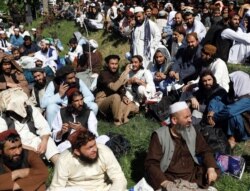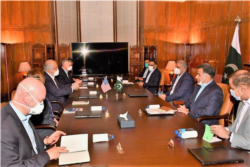U.S. envoy for Afghanistan reconciliation, Zalmay Khalilzad, has met with leaders of the Taliban in Qatar to review the implementation of a peace deal with the Islamist insurgency aimed at ending nearly two decades of Afghan conflict.
A Taliban spokesman, while releasing details of Sunday’s meeting in the Qatari capital Doha, said Khalilzad was accompanied by Gen. Scott Miller, the U.S. commander of international troops in Afghanistan.
“Both sides talked about speedy release of the prisoners and commencement of intra-Afghan negotiations, in addition to other relevant matters,” tweeted Suhail Shaheen, who speaks for the Taliban’s political office in Doha.
Shaheen said Mullah Abdul Ghani Baradar, the political deputy to the Taliban chief, led the insurgent delegation at Sunday’s talks. He noted that Qatar’s foreign ministry’s special envoy, Mutlaq al-Qahtani, also attended the meeting.
In a pre-visit announcement last week, the U.S. State Department had said the “primary focus” of Khalilzad’s trip will be to “obtain agreement between the Afghan parties on the practical next steps necessary for a smooth start to intra-Afghan negotiations.”
The long-awaited intra-Afghan dialogue, however, is tied to a prisoner swap between the Afghan government and the insurgent group, stipulated in the U.S.-Taliban agreement.
Kabul is required to set free 5,000 Taliban inmates in exchange for 1,000 Afghan personnel being held by insurgents. So far, the Taliban says it has released close to 460 detainees while the government says it has freed around 2,700 insurgents.
Battlefield hostilities, meanwhile, have spiked in recent weeks, with the Taliban launching major raids against Afghan security forces, killing dozens of them. The government has responded by stepping up counterinsurgency operations.
The insurgents, however, have stopped attacks against U.S.-led international forces in line with the pact, which requires all foreign forces to leave Afghanistan by mid-2021 in return for the Taliban’s counterterrorism assurances. The U.S. military also has halted direct attacks on insurgents
The Taliban and the Afghan government observed a temporary cease-fire during three-day annual Eid festivities, which ended on May 26. But violence has since increased again, prompting the U.S. military last week to launch airstrikes to disrupt Taliban attacks on Afghan forces.
Khalilzad visits Pakistan
After his meeting in Doha with Taliban leaders, Khalilzad traveled to Pakistan, where he met with the country’s military chief, General Qamar Javed Bajwa. A military statement said that the Afghan political reconciliation process, Pakistan’s efforts to boost security at its long border with Afghanistan, and the presence of nearly 3 million Afghan refugees on Pakistani soil came under discussion.
“Both (Bajwa and Khalilzad) shared steps taken in this regard and agreed to continue working towards mutually agreed goals,” the statement said.
A U.S. embassy statement said the two sides took note of an accelerated prisoner release and reduced violence ahead of intra-Afghan negotiations, crediting the Eid cease-fire with the progress.
It said Khalilzad “expressed his appreciation” for the role Pakistani Prime Minister Imran Khan and Bajwa “are playing in support of peace in Afghanistan.”
Khalilzad and Bajwa “agreed peace in Afghanistan offers an unprecedented opportunity to advance security, connectivity and development for the region,” the statement added.
Pakistan is believed to have maintained close ties to Taliban leaders and fighters whose families live among Afghan refugees. Islamabad takes credit for bringing the insurgents to the table for talks with the United States that produced the landmark Feb. 29 agreement between the two.
Khalilzad is scheduled to visit Afghanistan on the last leg of his latest three-nation trip.






